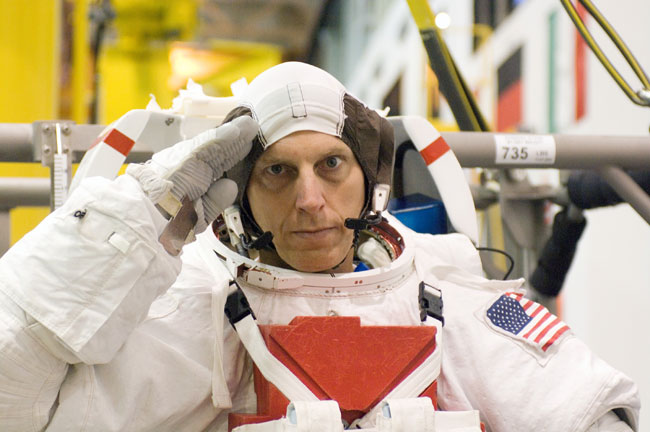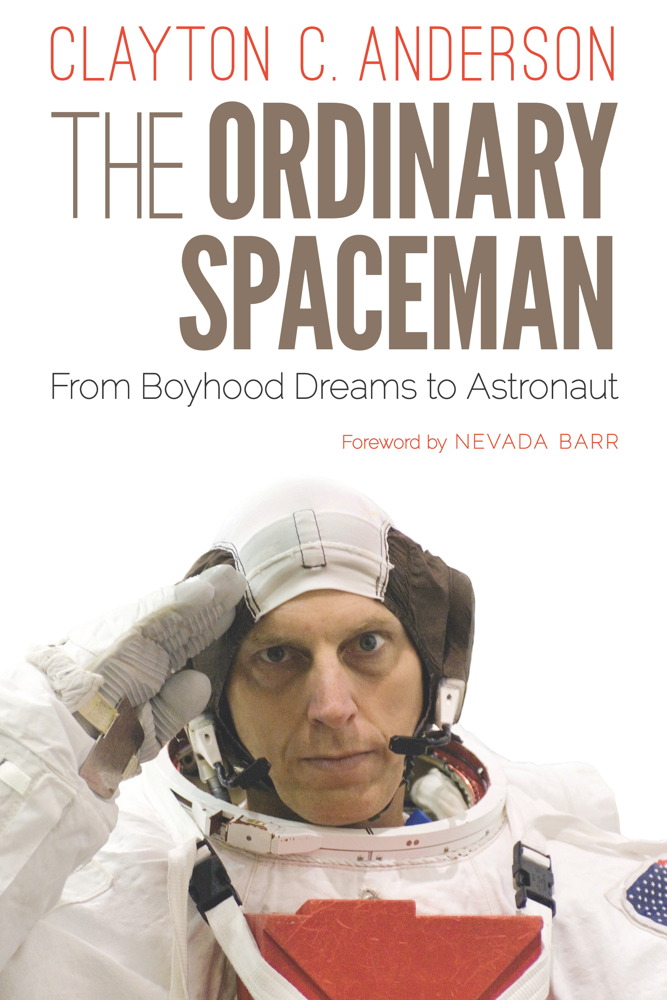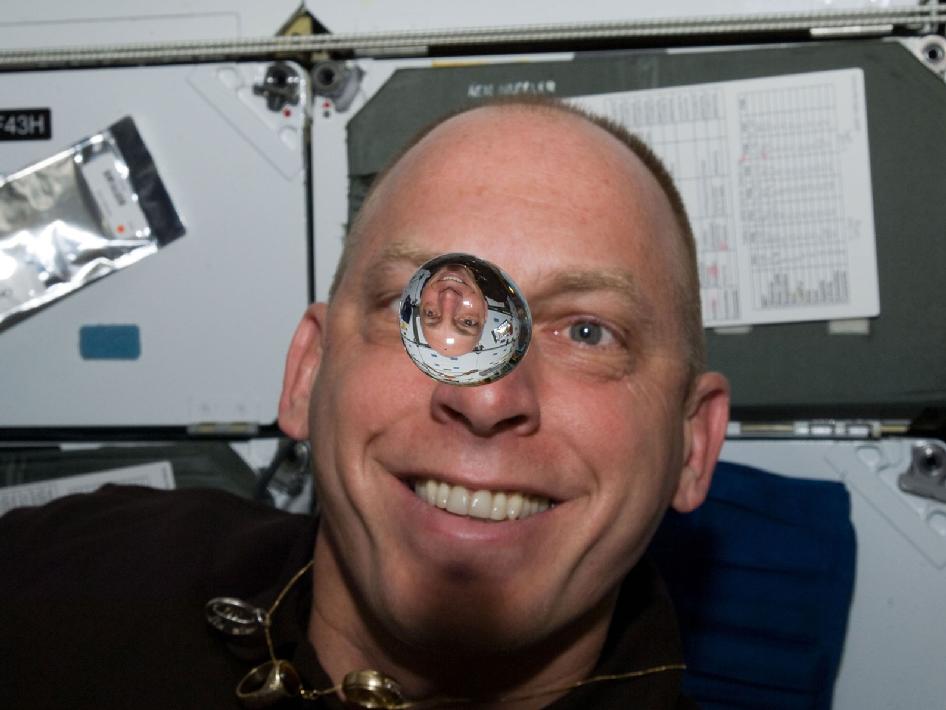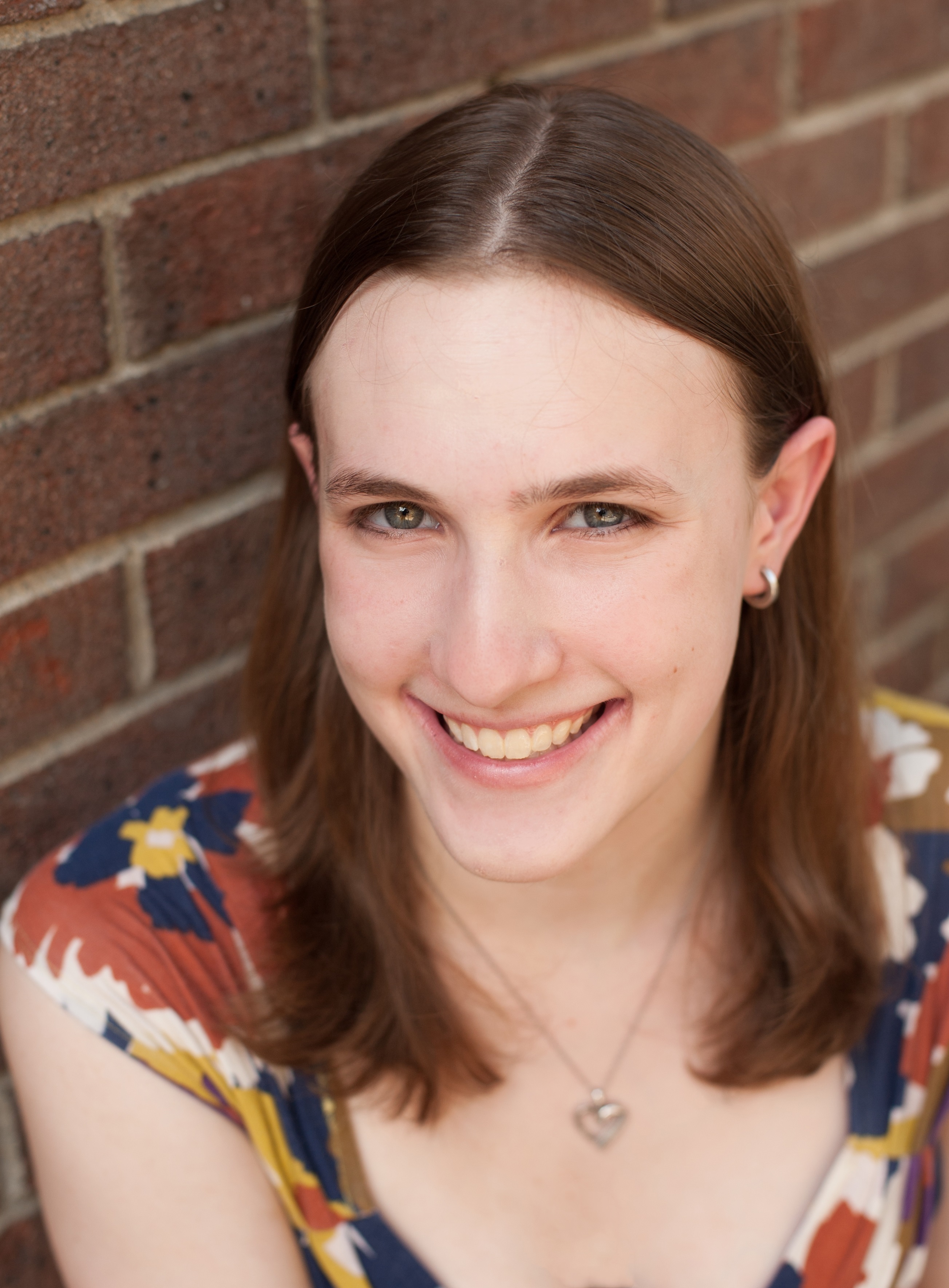For 'The Ordinary Spaceman' Clayton Anderson, Astronaut Life Is Anything But

When Clayton Anderson began to write about his 30-year NASA career, he was warned that astronaut memoirs are "a dime a dozen, and all the same." But that didn't deter him — and his new book is far from an "ordinary" space narrative.
In "The Ordinary Spaceman: From Boyhood Dreams to Astronaut" (University of Nebraska Press, 2015), Anderson traces his childhood, career, 15 applications to the astronaut training program and, finally, his training and two flights to space (one of which was a long-duration flight), Anderson covers his daily activities and unusual experiences with detailed and humorous observations. You can read an excerpt of "The Ordinary Spaceman" here.
In a recent interview, Space.com caught up with Anderson to hear more about his new memoir, the challenges of being an astronaut and unusual space pastimes. [Best Space Books and Sci-Fi: What We're Reading Now]
Space.com: How did you come to write a memoir?

Clayton Anderson: It started with me writing journals, simple one-page stories throughout my training to go into space. But it really began with NEEMO 5 [a training mission to the underwater habitat Aquarius in 2003], when we were asked by NASA to write some journals while we were living underwater […] so maybe three or four people could read them. And I really enjoyed it; I tried to make them simple, straightforward, fun and informative, and I got very good feedback from the people that did read them. Once I finished with NEEMO and began continued training exercises and traveling to Russia for the first time and that sort of thing, if something really cool happened to me, it would inspire me to write a one-page journal that I could provide to NASA. I'd put a couple pictures in, and they would post it on the Web.
Well, the more I did, the more cool and unique things transpired — unique aspects of the training that really had nothing to do with definitive training, but [that were] part of the training experience, part of the life experience of being an astronaut. And those were the things that were the most fun for me [to write about]. That made it real, took away the homesickness for a bit, helped raise my spirits if I was a little depressed. And so I had a compilation of those things.
Space.com: If astronaut memoirs are "a dime a dozen," what distinguishes yours?
Get the Space.com Newsletter
Breaking space news, the latest updates on rocket launches, skywatching events and more!
Anderson: I think mine tells stories that most astronauts won't tell, or don't tell. For example, my time as a family escort for Columbia is a very personal chapter for me. To write about the worst day of your life, as an astronaut, is unique, I think. I've never read an astronaut's book where they discuss flying in a T-38 [a supersonic trainer aircraft] for the first time, and not being a pilot makes it even more unique. I was a simple backseater who was doing something that he never dreamed he would do. I don't know that an astronaut has written a book with a chapter in it that talks about the impact that they had on the lives of two kids, or that have been honest and upfront enough to talk about the errors that I made and how they cost me career-wise.
So, while my memoir may be an astronaut memoir, I think it's a unique astronaut memoir. And I don't try to educate people on how my life as an astronaut can help them have a better life. What I try to do is tell the stories of what happened to me, how it affected me and my family and my career, and then let people draw their own conclusions and applications to their own lives.
Space.com: What do you think makes a good astronaut?
Anderson: It's more than just skills, and I think sometimes that the astronaut world considers skills only as making a good astronaut. Now, I didn't play the game very well. I was outspoken, but I wasn't outspoken until I had the knowledge and the space experience and the demonstrated skills that I felt qualified me to be outspoken. As a baby astronaut, I kept my head down, and I kept coloring and I tried to do the right thing […] and be there for the other astronauts. And I was very successful at that, which I believe helped me get flight assignments.
And I think that I was very successful in space, except for the fact that I was outspoken when I thought things were incorrect, inefficient or inappropriate. And the reason I was outspoken was, I believed I was up there to help make it better for those who flew in the future. But I would learn the hard way that there's a game you have to play if you want to fly again, and if you want to be considered one of the elite astronauts versus one of the others. And I didn't play that game very well.
Space.com: Would there have been a chance later on to help other astronauts going forward?
Anderson: Actually, I tried. I wrote emails for the other astronauts that were flying after me, and the emails were called "The things I learned this summer" — because mostly, I was up there for the summer months, June through September, in Houston. So, I would write things to the other guys and send them to them, and many of them responded that they were very helpful. I would give them tips: Here's what I do when I use the bathroom, or here's something you need to know about the printer that's very helpful, that nobody tells you until it's too late — or things like that to make life on board their station better. And I met with some of them in meetings when I was back on Earth, to try to give them advice on what life is like and how you can succeed. But what I found was — too often, in my opinion — that in debriefs, they hear the good stuff, but they don't hear and react to the not-so-good stuff. And it takes a long time to effect change. For example, I took the crew debrief memos from Expeditions 1 through 13 with me into space. I read them every month so that I would be reminded [of] what inefficiencies and issues the previous 13 crews had that I needed to be aware of.
Too often, if an astronaut doesn't speak up and say, "Hey, this is really busted; we really need to get this fixed" — and many of them argue that they do, but I think that I was trying to give more emphasis from space because I had a voice in space — I think your voice gets lost once you get back on the ground.

Space.com: If there were one thing you wanted people to get from your book, what would it be?
Anderson: They are just like me. I am just like them. For every kid out there in the Midwest, or the West Coast, or the East Coast, or the northwest United States, they're just like me. They are ordinary, and if they add a little "extra" to the "ordinary," they can be "extraordinary." But they need the help of others around them. And that mind-set — if people do read the book and take away one thing, it would be nice if they took away the mind-set that people can accomplish extraordinary things, but it's never just them accomplishing that extraordinary thing. It's them and all those people throughout their life that have impacted and made them the person they are at the time they accomplished the extraordinary thing.
It's also important for me to let people know that being an astronaut was the most amazing job in the universe. I dreamed of doing it ever since I was a kid, and I'm so proud I did it and did well. What the book is trying to do is to point out that being an astronaut is not all ice cream and roses. There are difficulties that I, at least, encountered every day. My hope is that people understand just how difficult that job is, even though it's tremendously rewarding and fun, and how — for me, anyway — there were struggles I had to overcome. There were struggles for my family; there were struggles with my training and colleagues, obviously. But I believe I was a tremendously successful astronaut and a damn good one. Now, to get people to agree with me — we might have to take a poll.
Space.com: I heard one time you dressed as a vampire in space.
Anderson: You need to make it interesting for people on Earth. If they see a dude floating around in a vampire cape, they'll go, "What's he doing?" I was kind of famous for the "What's he doing?" part. I put boxer shorts on my head, I held up Tootsie Roll pops in my hand five at a time and tried to get the ground-control team to tell me which flavor to select. I guess I was ahead of my time, because if we'd have had Twitter and social media back then, boy, we'd have had a blast.
I would also do "Famous Cities from Nebraska," being the only astronaut from Nebraska. I had printed in my crew notebook the entire list of 893 cities in Nebraska at the time, and I put them in a spreadsheet. And most every day, I tried to name three to five cities from Nebraska. I'd get on the loop at the end of the day, and I'd say, "Hey, Houston, this is Station on Space to Ground 2, and it's time for Famous Cities from Nebraska!" And I'd say, "Today's cities are Burwell, and Lincoln and Osceola." And the ground [control team] thought that was pretty tedious, and they weren't very excited I was doing that. But it was my way to make what I was doing relatable to humans, and especially to humans that lived in the state of Nebraska.
Email Sarah Lewin at slewin@space.com or follow her @SarahExplains. Follow us @Spacedotcom, Facebook and Google+. Original article on Space.com.
Join our Space Forums to keep talking space on the latest missions, night sky and more! And if you have a news tip, correction or comment, let us know at: community@space.com.

Sarah Lewin started writing for Space.com in June of 2015 as a Staff Writer and became Associate Editor in 2019 . Her work has been featured by Scientific American, IEEE Spectrum, Quanta Magazine, Wired, The Scientist, Science Friday and WGBH's Inside NOVA. Sarah has an MA from NYU's Science, Health and Environmental Reporting Program and an AB in mathematics from Brown University. When not writing, reading or thinking about space, Sarah enjoys musical theatre and mathematical papercraft. She is currently Assistant News Editor at Scientific American. You can follow her on Twitter @SarahExplains.









